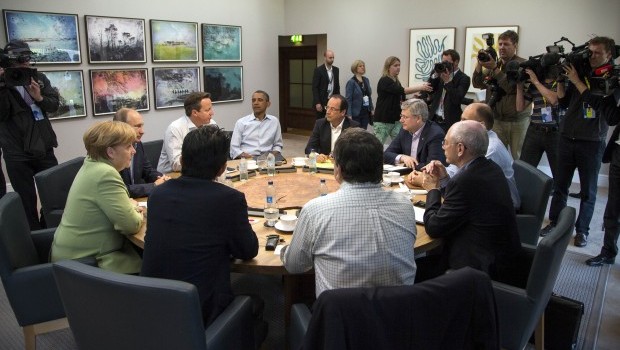
Leaders of the G8 member countries attend the second plenary work session at the G8 Summit in Lough Erne, Northern Ireland, Britain, on June 18, 2013. Leaders are, from left, German chancellor Angela Merkel, Russian president Vladimir Putin, British prime minister David Cameron, US president Barack Obama, French president François Hollande, Canadian prime minister Stephen Harper, Italian prime minister Enrico Letta, European Council president Herman Van Rompuy and European Commission president José Manuel Barroso. (AP Photo/Ian Langsdon, Pool)
According to press reports, the Russian president vetoed language implying that Syria’s president, Bashar Al-Assad, should step down from power, a key demand of the Syrian opposition. Instead, Russia has maintained that peace negotiations should take place without pre-conditions on who should attend.
Russian deputy foreign minister Sergei Rybakov told reporters that Russia opposed the move because it “would be not just unacceptable for the Russian side, but we are convinced that it would be utterly wrong, harmful and would completely upset the political balance.”
Nonetheless, he said that the final document would still be “a serious, concrete document on Syria that has not been watered down,” and that G8 leaders would call for progress towards a peace conference.
Following a meeting yesterday, both US president Barack Obama and Putin agreed to continue diplomatic efforts to find a solution to the crisis. Both men admitted that the positions of the US and Russia towards Syria remained divergent.
Speaking after a two–hour meeting with Obama on the fringes of the summit, Putin told reporters: “Our positions do not fully coincide, but we are united by the common intention to end the violence, to stop the number of victims increasing in Syria, [and] to resolve the problems by peaceful means, including the Geneva talks.”
“We agreed to push the process of peace talks and encourage the parties to sit down at the negotiation table, organize the talks in Geneva,” he added.
Diplomatic sources speaking to the Reuters news agency said that this means that the proposed peace conference on Syria, dubbed Geneva II, is now unlikely to take place before August.
Britain’s prime minister, David Cameron, used the summit to put forward a five-point plan aimed at resolving the crisis in Syria, which is so far estimated to have killed almost 100,000 Syrians and turned millions into refugees.
The plan included a call for a new transitional government in the country with full executive authority over the Syrian military, as well as extra assistance for Syrian refugees, measures to isolate radical “jihadists” within the ranks of the opposition, and a fresh declaration that the use of chemical weapons is an intolerable escalation of the conflict.
Russian officials have also criticized the recent announcement by the US that it will supply military aid to the opposition, as well as British and French proposals to arm opponents of the Syrian government.
Speaking at a press conference with Cameron in London on Sunday, Putin said that many rebels in Syria were extremists. “You will not deny that one does not really need to support the people who not only kill their enemies, but open up their bodies, eat their intestines in front of the public and cameras,” he said. “Are these the people you want to support? Is it them who you want to supply with weapons?”
Within Syria, rebels say that they have already begun to take delivery of anti-tank missiles, courtesy of another Middle Eastern country they refused to name.
Speaking on condition of anonymity, a senior source in the Free Syrian Army (FSA) based in Damascus told Asharq Al-Awsat that the first batch of new weapons were supplied to the rebels on June 9, from over the Turkish border.
The shipment included 250 Russian-made Konkurs guided anti-tank missiles, according to the source, and several hundred B-10 recoilless rifles, a small Russian artillery weapon that can be transported and fired by a small team of soldiers.
He said: “Priority was given to extremist Islamist groups, and the Ahrar Al-Sham movement received a large share.” The weapons also reached the Liwa Al-Islam group (also known as the Islam Brigade), affiliated to the Islamist Syrian Liberation Front.
“The Konkurs missiles and new B-10 recoilless rifles were not present prior to this; however, they entered these weapons stores before the last Organization of Islamic Cooperation (OIC) conference on Syria that was held in Cairo on June 13,” he added.
The source claimed that all such weapons stores in Syria are under the control of the Ahrar Al-Sham movement, who are responsible for distributing them according to the instructions of the unnamed regional country, and in agreement with the US.

The great poet Allamah Iqbal says”quuat fikr-o- Amal pahle fana hoti hai, Tab kisi qom ki shokat pe zawal aata hai” it means the willpower dies first, then a nation falls into decline, this stanza applies to the Syrian nation, Syria was the huge symbol of Islamic culture and tradition for a long time, but unfortunate civil war turned this country in to hell, how the tyrant ruler and dictator Basharul Asad forgot that their civilians are the descendants of companions of prophet Muhammad (peace Be Upon Him) who stomached each and every cruelty, injustice, and bloodbath for entire human beings, so that the coming generations would live in peaceful ambiance, but people like Basharul Asad nullified his efforts, enough blood of innocent children and women has flowed in the street of Syria so far, Islamic world must strive to settle the heavy blood bath between two armies by setting BasharulAsad aside.